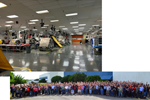ST Engineering MRAS presents initiatives to drive autoclave efficiency, automation
During a JEC World 2024 panel discussion, the company revealed ways in which it is maximizing throughput and efficiency of its autoclaves and enhancing composites production processes.
During JEC World 2024, ST Engineering MRAS (Baltimore, Md., U.S.) announced a series of new initiatives aimed at enhancing autoclave efficiency and advancing automation in composites manufacturing. Mitch Smith, director of technology and process engineering, and acting vice president of operations at MRAS, highlighted these developments during a panel discussion on “Composites 4.0: Unlocking Efficiency and Sustainability Through Automation and Digitalization.”
During this panel, MRAS revealed its novel dynamic scheduling system designed to maximize throughput and efficiency for the autoclaves it operates, which number nearly a dozen. This system continually monitors material journeys and coordinates batch curing with machine run schedules to optimize autoclave capacity. MRAS’ approach to autoclaves aims to improve its own energy efficiency by using processing time more effectively, reducing energy consumption and improving sustainability.
“Our team is dedicated to finding the most effective ways to use our autoclaves,” says Smith. “By optimizing load scheduling and ensuring parts are autoclave-ready, we can significantly increase efficiency and reduce waste.”
In addition to autoclave optimization, MRAS is investing in advanced IT systems, cybersecurity and robotic hardware to enhance production processes. These technologies are part of the company’s broader strategy to create a “Factory of the Future” that balances current technological capabilities with forward-looking innovations.
“Implementing digital systems helps us be more competitive on future programs and optimize our current product stream,” Smith explains. “Automation can enhance job quality and create opportunities for higher technical learning among staff. Robotics enable our staff to engage in more advanced technical tasks, which not only contributes to their professional growth but also to the overall advancement of our business.”
To ensure that both human expertise and digital systems can work together harmoniously, MRAS has embarked on getting buy-in from experienced staff and involving them early in the transition to automated processes. “Automation systems provide valuable insights, but they require validation by experienced staff to ensure accurate and effective implementation,” Smith adds. “It’s about combining human judgment with data-driven suggestions to achieve the best outcomes.”
Related Content
-
New Frontier Technologies launches digital twinning, high-fidelity simulation capability
3D imaging and analysis capability illustrates detailed, quality characterization and performance simulation of composites and other advanced materials that properly captures the as-manufactured component.
-
Siemens Gamesa, Airborne develop automatic preforming robot system for offshore wind blades
Danish-funded ALMA project furthers collaboration, adds new functionality, advanced sensor systems and digital twinning for reduced man-hours, waste and cost per blade.
-
Aerotech Academy Puglia is inaugurated at Leonardo Aerospace site in Grottaglie, Italy
Joining the Leonardo MaTeRIA Lab and Joint Lab with Syensqo, this aerostructures training course will be 75% materials science and structural design/analysis, 25% digital transformation and AI.

















